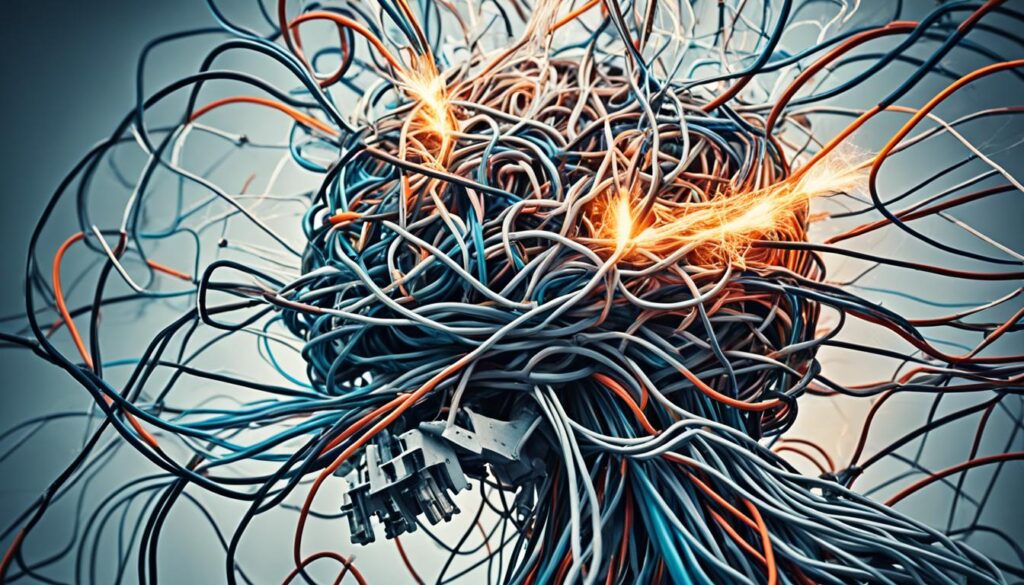Understanding Manic Depression in Adolescence

Did you know about 2.9% of adolescents in the U.S. are affected by manic depression, also known as bipolar disorder? This number highlights the significant impact of manic depression in adolescence on our youth’s mental health. Young people with this illness experience profound mood changes that can disrupt their daily lives and negatively affect their development in social, academic, and personal areas.
Today, we’ll talk about manic depression in teens, looking at its causes, symptoms, and how it’s diagnosed and treated. We’ll also cover its complications and ways to support teenagers who deal with this condition. Understanding the special struggles of teens with bipolar disorder helps us give them the support and resources they need. This way, they can handle their symptoms better and enjoy life more.
What is Manic Depression?
Manic depression, known too as bipolar disorder, is a mental health condition. It causes big changes in mood and behavior. These changes are more intense than the usual ups and downs teenagers face, affecting their daily life.
Teens with this disorder face periods of extreme happiness and energy, called manic episodes. These episodes can last for days or weeks, making them act without thinking. They also have times of deep sadness and low energy, known as depressive episodes.
These mood swings can mess up their sleep, leading to too little or too much sleep. Energy levels in teens with manic depression can vary widely. They might feel very active or extremely tired. Trouble thinking clearly is also a common symptom, making hard for them to focus or make decisions.
“Manic depression, or bipolar disorder, is characterized by noticeable shifts in mood and behavior.”
It’s important to understand the signs of manic depression for early action and treatment. By spotting these signs early and getting the right help, we can support teens to manage their condition. This aids them in leading rewarding lives.
Symptoms of Manic Depression in Adolescence
Manic depression, also known as bipolar disorder, shows up differently in teens. It’s key to know the signs of this condition.
Manic Episodes
Teens with manic depression might show these signs during a manic episode:
- Mood swings: Adolescents may swing from being very happy to feeling irritable and angry.
- Irritability: They can feel annoyed and upset with others or themselves.
- Racing thoughts: Teens may have fast and unstoppable thoughts.
- Reckless behavior: They might act without thinking, like spending too much money, engaging in risky sexual activities, or using substances.
Depressive Episodes
Depressive episodes are part of manic depression, too, with symptoms like:
- Feelings of sadness: Teens might feel deeply sad and hopeless for a long time.
- Loss of interest: They may not want to do things they once enjoyed.
- Sleep problems: Sleeping too much or not enough can happen.
- Low energy levels: Teens often feel very tired and without energy.
Mood Swings
Mood swings are common in teens with manic depression. They can quickly move between feeling very up and very down. This can make daily life hard.
Parents, caregivers, and teachers should watch for these signs and get help if they think a teen is dealing with manic depression. Getting help early can really help teens manage their symptoms and improve their life quality.

Diagnosis of Manic Depression in Adolescence
Diagnosing manic depression in young people is not simple. It demands a deep look by a mental health expert. These experts collect vital details about the youth’s feelings, actions, sleep habits, and family mental health history. They focus on illnesses like depression or bipolar disorder. This helps in making a right diagnosis. It also aids in giving the right treatment and support.
When checking a young person for manic depression, experts look closely at the symptoms. They make sure these symptoms are not mixed up with other disorders. These can include depression, ADHD, mood dysregulation disorder, oppositional defiant disorder, and anxiety disorders. Getting the diagnosis right is key. It leads to a treatment plan that fits the person’s needs.
Thorough Evaluation by a Mental Health Professional
The first step is a detailed check-up by a mental health expert. This evaluation includes:
- Finding out in-depth information about the youth’s symptoms and how they affect everyday life
- Looking deeply into the family’s history of mental illness, especially depression and bipolar disorder
- Checking the youth’s sleep patterns, as changes may show mood disorders
This wide-ranging evaluation helps mental health experts understand the young person’s condition better. It also helps rule out other potential causes or disorders happening at the same time.
Accurate Diagnosis for Effective Treatment
Correctly diagnosing manic depression in youth is vital. It ensures they get the right treatment and support. With a correct diagnosis, health care experts can:
- Give medications that specifically target manic depression symptoms
- Suggest therapy, like psychotherapy or family therapy, to tackle emotional and behavioral challenges
- Offer help and resources for handling other conditions, such as ADHD or anxiety disorders, for overall health
Ultimately, the right diagnosis helps health care experts create a full and personal treatment plan. This supports the youth in managing their manic depression effectively.
| Steps in Diagnosing Manic Depression in Adolescence |
|---|
| Gathering information on symptoms, family history, and sleep patterns |
| Differentiating manic depression from other disorders with similar symptoms |
| Conducting a thorough evaluation by a mental health professional |
| Establishing an accurate diagnosis for effective treatment planning |
Causes of Manic Depression in Adolescence
The reasons behind manic depression in teens are complex and not fully known. Research points to genetics playing a key role. If someone in your family has bipolar disorder, you might be more at risk.
Traumatic events and big life changes can also lead to bipolar disorder in teens. Things like abuse, losing someone, or moving can trigger mood swings. These experiences can combine with genetic risks, making the disorder more likely.
Also, studies show that teens with bipolar disorder may have different brain structures and functions. This could mean that certain neurological issues play a part in manic depression. While the exact link is not clear, these brain differences might affect mood and behavior.
Research suggests that genetic factors, family history, trauma, a combination of stressful life events, and brain structure and function contribute to the development of manic depression in adolescence.

| Causes | Description |
|---|---|
| Genetic Factors | Manic depression often runs in families, suggesting a genetic component in its development. |
| Family History | Individuals with a familial history of bipolar disorder are more likely to develop manic depression. |
| Trauma | Experiencing trauma, such as abuse or significant life changes, can trigger manic depression in susceptible individuals. |
| Stressful Life Events | Other stressful life events, such as loss or major transitions, can contribute to the onset of manic depression. |
| Brain Structure | Differences in brain structure have been observed in individuals with bipolar disorder, suggesting neurological involvement. |
| Brain Function | Abnormal brain function may play a role in the dysregulation of mood and behavior seen in manic depression. |
Treatment for Manic Depression in Adolescence
When treating manic depression in young people, it’s vital to use a mix of medication, therapy, and support. This approach helps manage symptoms well and boosts overall well-being.
Medication
Medication is key in treating manic depression in teens. Medicines like lithium or valproate help balance mood swings. They correct the brain’s chemical imbalances. Sometimes, antidepressants are also given to lessen the depression seen in manic episodes.
Therapy
Therapy plays a big role in treating manic depression in youths. Cognitive-behavioral therapy (CBT) is a common method. It teaches individuals to change negative thoughts and build good coping skills. CBT is great for helping teens handle their feelings and live better lives.
Family Therapy
Manic depression impacts the individual and their family. Family therapy greatly aids the teen and their family in dealing with bipolar disorder. It offers a chance for honest talks, solving conflicts, and stronger family ties. This therapy allows the whole family to learn how to deal with the disorder as one.
Support and Managing Symptoms
Teens with manic depression need ongoing support besides medication and therapy. This includes regular visits to doctors, maintaining a good home atmosphere, and ways to deal with symptoms. Support groups offer emotional support and a sense of belonging to teens facing the challenges of bipolar disorder.
A detailed treatment plan, including medication, therapy, and support, is crucial. It lets teens handle their manic depression well and enjoy life. Parents, caregivers, and doctors must work as a team. This ensures that these young people get the support and tools they need to succeed.
Complications of Manic Depression in Adolescence
Teens with manic depression are more likely to face mental health issues. Knowing these risks helps with early support. Common challenges include:
Substance Abuse: Teens might use drugs or alcohol to cope. It’s important for those around them to spot and act on any drug use signs.
ADHD: ADHD often goes hand in hand with manic depression. ADHD symptoms can make bipolar disorder even harder to deal with.
Anxiety Disorders: These teens might also feel very anxious. This can include feeling scared in social settings or having panic attacks.
Behavior Problems: They may act impulsively, get angry easily, and break rules. This can hurt their relationships with everyone around them.
Suicidal Thoughts and Suicide Attempts: Sadly, these teens think more about suicide and may try to take their own lives. This is a critical issue that needs quick action.
It’s vital for parents and doctors to watch for these problems. Spotting them early and taking action can really help a teen’s mental health.
Understanding the Risks
Teens with manic depression face many risks. These include substance abuse, ADHD, anxiety, behavior issues, and suicidal thoughts. Dealing with these can make life very hard. Offering strong support and mental health resources is key to helping them.
Supporting Adolescents with Manic Depression
Parents and caregivers are key in helping teens with manic depression. They can create a caring space for teens to cope better. This aids in improving their general health and happiness.
Open Communication: Keeping communication open is key with teens facing manic depression. Urge them to share their thoughts and feelings. Let them know you’re always there to support them.
Understanding Triggers: Knowing what worsens your teen’s manic depression is crucial. Parents and caregivers should work with doctors to find ways to manage these triggers.
Therapy: Therapy is vital in treating manic depression. Encourage your teen to go to therapy often. Including the whole family in sessions can help everyone understand and discuss bipolar disorder openly.
Medication Adherence: Making sure your teen takes their medication as prescribed is critical. Work together with the healthcare team to keep a steady medication schedule. Support them to stay consistent with their meds.
Home Safety: Ensure your home is safe by keeping medicines and weapons secure. This prevents danger and keeps your teen safe. Check your home regularly to reduce any risks.
Crisis Hotlines: Be aware of crisis hotlines and emergency services in your area. Always have this information handy in case your teen is in danger or has thoughts of suicide. Quick help can be lifesaving.
Parental support, open communication, understanding triggers, ensuring therapy and medication adherence, making the home safe, and knowing about crisis help can greatly help teens with manic depression.
Conclusion
Managing manic depression, known also as bipolar disorder, is tough for teens. Yet, with proper treatment and support, they can lead fulfilling lives. It’s key that parents and healthcare providers spot the signs early and get the right help.
Helping teens with this disorder means creating a caring environment. Emotional support and open talks are vital, as is therapy. Getting professional help and sticking to treatments are crucial steps for wellness.
We can change the lives of teens facing manic depression. By spreading awareness and support, we encourage them to seek help. With proper guidance, these teens can overcome obstacles and enjoy their lives.






